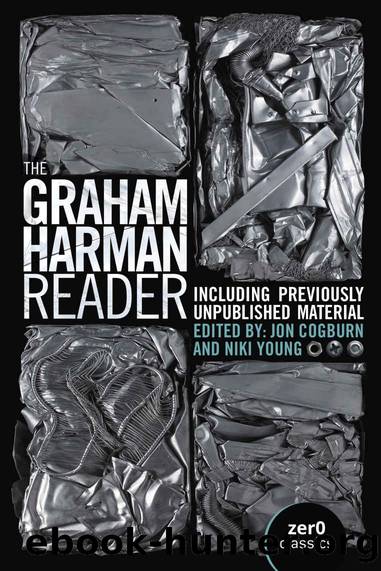The Graham Harman Reader by Graham Harman

Author:Graham Harman [Harman, Graham]
Language: eng
Format: azw3
ISBN: 9781803412412
Publisher: John Hunt Publishing
Published: 2023-02-24T00:00:00+00:00
III. The New Criticism
We have seen that for object-oriented philosophy, there is a series of tensions between objects and their qualities. Real objects withdraw from all human access and even from causal interaction with each other. This does not mean that objects engage in no relations (for of course they do), but only that such relations are a problem to be solved rather than a starting-point to be decreed, and furthermore that these relations must always be indirect or vicarious rather than direct. No object relates with others without caricature, distortion, or energy loss; knowledge of a tree is never a tree, nor do two colliding asteroids exhaust one anotherâs properties through this contact. At first glance, this model of objects might seem to step backward into a retrograde intellectual past. According to one familiar narrative cited above, philosophers used to be naïve realists who believed in real things outside their social or linguistic contexts; these things were ascribed timeless essences that were not politically innocent, since they subjugated various groups by pigeonholing each of them as oriental, feminine, pre-Enlightenment, or some other such tag. According to this view, we have luckily come to realize that essences must be replaced with events and performances, that the notion of a reality that is not a reality for someone is dubious, that flux is prior to stasis, that things must be seen as differences rather than solid units and as complex feedback networks rather than integers. I will deal with these prejudices as this article progresses.
For the moment, we should simply consider what might seem to be obvious similarities between the relationless concept of objects just presented and the New Criticismâs long unfashionable model of poems as encapsulated machines cut off from all social and material context. In âThe Heresy of Paraphrase,â surely the most famous chapter of his book The Well Wrought Urn, Cleanth Brooks says that a poem cannot be paraphrased. What this strictly means is that the poem cannot be rephrased as a series of literal propositions, yet it can also be taken to mean (as Brooks argues elsewhere) that poems cannot be reduced to the series of social influences or biographical facts that gave rise to them. The poem is an integral unit irreducible either to its ancestors or its heirs, not constituted by its relations in any decisive way. This might seem to have dismal political consequences, since the poem as a closed-off unit seems to lead to an aesthetic elitism supporting a privileged caste of white ruling-class men and their arbitrarily selected literary canon. I will consider the political side of the question in the next section, when discussing the New Historicism. Here I only want to show that Brooks is by no means true to the non-relational view of poems that he seems to propose.
The object-oriented side of Brooks can be found in his hostility to paraphrase. A poem cannot be translated into literal prose statement: âall such formulations lead away from the center of the poem â not toward it â¦.
Download
This site does not store any files on its server. We only index and link to content provided by other sites. Please contact the content providers to delete copyright contents if any and email us, we'll remove relevant links or contents immediately.
| Deconstruction | Existentialism |
| Humanism | Phenomenology |
| Pragmatism | Rationalism |
| Structuralism | Transcendentalism |
| Utilitarianism |
The remains of the day by Kazuo Ishiguro(7614)
Tools of Titans by Timothy Ferriss(7016)
The Black Swan by Nassim Nicholas Taleb(6252)
Giovanni's Room by James Baldwin(5956)
Inner Engineering: A Yogi's Guide to Joy by Sadhguru(5942)
The Way of Zen by Alan W. Watts(5840)
The Six Wives Of Henry VIII (WOMEN IN HISTORY) by Fraser Antonia(4822)
The Power of Now: A Guide to Spiritual Enlightenment by Eckhart Tolle(4803)
Astrophysics for People in a Hurry by Neil DeGrasse Tyson(4649)
Asking the Right Questions: A Guide to Critical Thinking by M. Neil Browne & Stuart M. Keeley(4636)
12 Rules for Life by Jordan B. Peterson(3792)
The Ethical Slut by Janet W. Hardy(3544)
Skin in the Game by Nassim Nicholas Taleb(3510)
Housekeeping by Marilynne Robinson(3450)
The Art of Happiness by The Dalai Lama(3417)
Double Down (Diary of a Wimpy Kid Book 11) by Jeff Kinney(3312)
Skin in the Game: Hidden Asymmetries in Daily Life by Nassim Nicholas Taleb(3296)
Walking by Henry David Thoreau(3260)
12 Rules for Life: An Antidote to Chaos by Jordan B. Peterson(3221)
